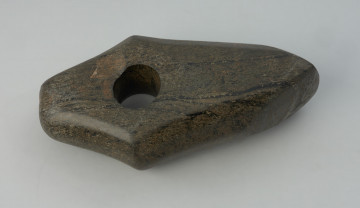
Stone axe
National Museum in Szczecin
Part of the collection: Stone Age
A half-piece of a stone axe from the Younger Stone Age, cracked during drilling, found its way to the museum collection in the early 1930s. It was donated by an inhabitant of Klęskowo (German: Hökendorf), a village which was incorporated into the Szczecin agglomeration in 1939. The artefact allows tracing the sequence of basic steps taken during the production of stone axes - tools or weapons with a hole for a handle and a blade parallel to the butt. The surface of a pre-selected piece of rock, shelled to the general outline of the planned object, was shaped with rebounds using tools resembling rebounders or narrow chisels. It was then levelled by abrasion on a stone slab. In the thus prepared blank, the drilling of the hole for attaching the handle began. The work was probably done with a wooden drill, where the drill stem was wrapped with string or thong tied to the ends of the crossbar. Moving the crossbar horizontally (bow drill, string drill) or vertically (pump drill) set the drill in motion. A straight section of hollow bone was used as the tip of the drill bit, forming a tubular drill, which left a trace of the core (the so-called drill stub) inside the hole, which was partially broken off during the deepening of the hole. Drilling started from the top and bottom sides, but only continued from one surface until the object broke. The drilling of the hole was quite a dangerous stage in axe production. Usually only after the drilling was finished the labour-intensive finishing of the surface was carried out by careful grinding (honing) on a grinding plate. Several stone axes, including unfinished forms, have been discovered near Klęskowo, some of which may be associated with the Early or Late Neolithic. Given the shape and the use of double-sided drilling, the presented monument belongs to the latter.
Krzysztof Kowalski
Author / creator
Dimensions
cały obiekt: height: 20.3 cm, width: 4.2 cm
Object type
semi-finished product, axe, hatchet
Technique
carving; hand made, drilling
Material
stone
Origin / acquisition method
acquisition
Creation / finding place
Owner
National Museum in Szczecin
Identification number
Location / status